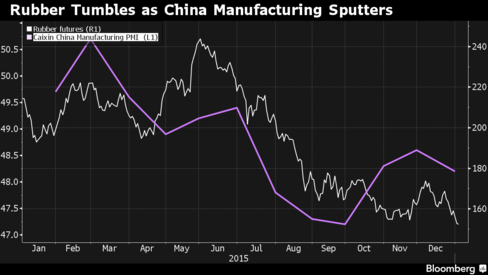Rubber tumbled to the lowest since 2009 after slowing manufacturing in China and the U.S., the two biggest economies, raised concern global growth is decelerating, worsening a glut of the commodity used in tires.
Futures for June delivery fell 1.4 percent to 150.6 yen a kilogram ($1,262 a metric ton) on the Tokyo Commodity Exchange, the lowest settlement for a most-active contract since March 2009. The benchmark price plunged 25 percent last year, the biggest annual decline since 2011.
Rubber is extending the slump as a global glut is forecast to widen amid softening demand. U.S. manufacturing contracted last month at the fastest pace in more than six years, while factory data in China contracted for a fifth consecutive month as economic growth in the biggest rubber consumer is expected to be the slowest since 1990.
“Weaker-than-expected Chinese data raises concerns of sluggish demand for rubber,” said Naohiro Niimura, a partner at research company Market Risk Advisory Co. in Tokyo. “Lower equity prices also put pressure on retail sales of vehicles in China.”

Global demand growth for natural rubber is estimated to slow to 1.3 percent to 12.6 million tons this year, while production expands 3.8 percent to 13 million tons, widening a glut to 411,000 tons, The Rubber Economist Ltd., a London-based industry researcher, estimated last month.
Stockpiles on the Shanghai Futures Exchange at the end of 2015 totaled 249,307 tons, the largest since at least January 2003, according to bourse data. China’s auto industry is likely to grow at an annual pace of 3.7 percent in the five years to 2020 compared with a rate of 6.9 percent in 2014, China Rubber Industry Association Secretary-General Mary Xu said in October.
In Shanghai, rubber for May delivery closed 0.3 percent higher at 10,190 yuan ($1,563) a ton after falling 22 percent last year, the third annual loss.
Thai rubber free-on-board in Bangkok fell 2.3 percent to 42.50 baht per kilogram, the lowest since December 2008. It lost 23 percent in 2015, the fifth yearly decline.



























